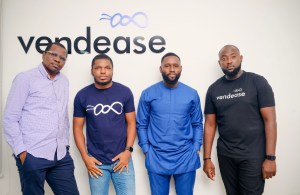Vendease, a food procurement platform for African restaurants, nabs $30M led by Partech Africa and TLcom • TechCrunch
[ad_1]
When Vendease launched in January 2020, it wanted to solve the challenges and inefficiencies in Nigeria’s highly fragmented food sector using a marketplace model that connected suppliers and farms to restaurants and food businesses, with deliveries facilitated within 24 hours.
But over the next couple of months, Vendease switched from its middleman role — after noticing that some of these businesses complained of delivery times, quality of food supplies and inadequate set-up to handle operations — to one where, building on its relationship with food suppliers, buys discounted products in bulk, stores them and makes deliveries through third-party logistics partners.
The YC-backed food procurement platform has doubled down on the pivot — instrumental to the company’s $3.2 million seed round last October — to raise $30 million in Series A funding (split between $20 million equity and $10 million debt).
CEO Tunde Kara, in an interview with TechCrunch, said Vendease plans to use the investment to deepen operations, consolidate its presence in eight cities across Nigeria and Ghana (the company recently expanded to the latter), move into new markets and build new products to increase customers’ efficiency.
“We’re building technology to efficiently move food from the point of production to the point of consumption,” Kara said on the call about his company’s drive. “Everything we build at Vendease: financing, logistics, warehousing, inventory management, is tailored towards ensuring that food flows efficiently from that point of production to the point of consumption.”
Vendease allows African restaurants and food business to buy supplies, access financial services and power their business operations. There’s a reason why Vendease is thorough about improving efficiency in this supply chain. According to the company, most customers, including restaurants and food businesses, hospitals, hotels, and schools, are subject to $100 billion in annual losses due to several factors. They range from unreliable supply and wastage to limited data on making informed procurement decisions to little or no capital to fund procurement. Its platform, described as a series of stacks, is designed to mitigate losses and help food businesses thrive.
The platform claims to have moved approximately 400,000 metric tonnes of food for its over 2,000 customers and assisted them in saving about $2 million in procurement costs and over 10,000 in person-hours over the last 12 months. Kara, who founded the company with Olumide Fayankin, Gatumi Aliyu and Wale Oyepeju, also mentioned that Vendease has saved its customers almost $500,000 in wastage costs due to overstocking. The chief executive attributed this progress to fully utilizing businesses’ data and providing them with the necessary resources — particularly around inventory management — at every step of their journey, including delivery routes: Vendease has slashed its delivery time from 24 to 12 hours.
“Since businesses don’t have access to accurate data, they usually buy what they dont need. We help them to solve that problem in two ways,” Kara commented on the company’s progress. “One, because businesses know they can get anything on our platform in 12 hours, they don’t need to stock some of the things they would’ve stored before. Two, they can also track what they bought and know how much is left before they need to buy again.”
While Vendease applies data to how it disburses working capital via its BNPL offering, there’s been a change of strategy from what it operated last year: instead of using its books, the company now partners with banks and financial institutions to provide financing through its platform. So far, businesses have accessed more than $12 million worth of inventory via the embedded finance product. Its revenue, which the company says has grown 5x over the past year, comes from deals it makes with suppliers; it’s yet to monetize its lending business.

Vendease founders
Ultimately, Vendease, while building the operating system that automates the flow of food from farm to restaurant, envisions itself as a plug-and-play solution for yet-to-be-launched African restaurants and food businesses in the next three to five years. The participation of lead investors in this round, TLcom Capital and Partech Africa (both control large pan-African funds), bodes well for that plan, said the chief executive adding that having both investors on board means his company has backers “ready to go the long haul.”
Andreata Muforo, a partner at TLcom Capital and Cyril Collon, general partner at Partech Africa, say they’re backing Vendease because they believe it can unlock significant value in Africa’s fragmented food supply chain and deliver robust solutions that impact critical issues around the food system on the continent, per the statement shared by Vendease. Other investors in the round include existing investors VentureSouq, Hustle fund, Hack VC, GFR Fund, Kube VC, Magic Fund and Kairos Angels (the company raised debt from the local finance market, per a statement).
For a non-fintech business, Vendease’s equity round closed somewhat quickly despite conversations around a cooling venture capital market, parties involved told TechCrunch. Investors’ interest in the business and the emergence of other players, such as OneOrder and TopUp Mama, indicate massive room for growth in this market segment where restaurants’ and food businesses’ needs are a priority. This holds more true in light of rising inflation and global food supply shortages, where the cost of food is 42% higher than it was between 2014 and 2016, per data from this food price index.
“Something important to us about our current growth and impact is despite the ongoing global food supply shortage and inflation, Vendease is helping our users save big and provide relative stability for their stock levels. Shielding them (to a large extent) from the most severe effects of the current global shortage,” commented Kara. “What excites us is we can have even more impact as we extend and entrench our technology within Africa and the rest of the world. And that’s what keeps us going.”
[ad_2]
